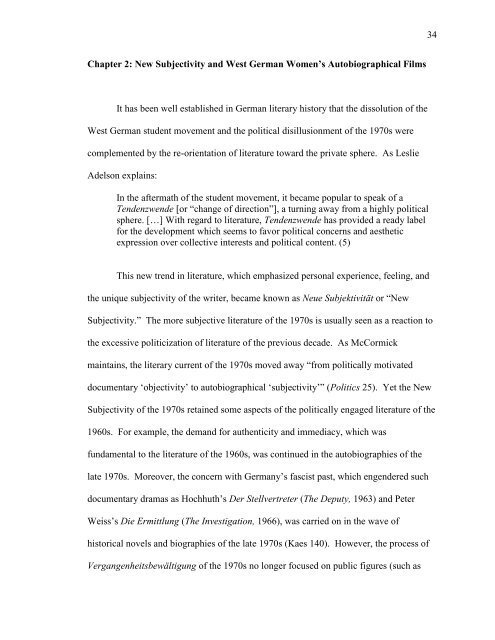'Murderer's House' - University of Victoria
'Murderer's House' - University of Victoria
'Murderer's House' - University of Victoria
Create successful ePaper yourself
Turn your PDF publications into a flip-book with our unique Google optimized e-Paper software.
Chapter 2: New Subjectivity and West German Women’s Autobiographical Films<br />
It has been well established in German literary history that the dissolution <strong>of</strong> the<br />
West German student movement and the political disillusionment <strong>of</strong> the 1970s were<br />
complemented by the re-orientation <strong>of</strong> literature toward the private sphere. As Leslie<br />
Adelson explains:<br />
In the aftermath <strong>of</strong> the student movement, it became popular to speak <strong>of</strong> a<br />
Tendenzwende [or “change <strong>of</strong> direction”], a turning away from a highly political<br />
sphere. […] With regard to literature, Tendenzwende has provided a ready label<br />
for the development which seems to favor political concerns and aesthetic<br />
expression over collective interests and political content. (5)<br />
This new trend in literature, which emphasized personal experience, feeling, and<br />
the unique subjectivity <strong>of</strong> the writer, became known as Neue Subjektivität or “New<br />
Subjectivity.” The more subjective literature <strong>of</strong> the 1970s is usually seen as a reaction to<br />
the excessive politicization <strong>of</strong> literature <strong>of</strong> the previous decade. As McCormick<br />
maintains, the literary current <strong>of</strong> the 1970s moved away “from politically motivated<br />
documentary „objectivity‟ to autobiographical „subjectivity‟” (Politics 25). Yet the New<br />
Subjectivity <strong>of</strong> the 1970s retained some aspects <strong>of</strong> the politically engaged literature <strong>of</strong> the<br />
1960s. For example, the demand for authenticity and immediacy, which was<br />
fundamental to the literature <strong>of</strong> the 1960s, was continued in the autobiographies <strong>of</strong> the<br />
late 1970s. Moreover, the concern with Germany‟s fascist past, which engendered such<br />
documentary dramas as Hochhuth‟s Der Stellvertreter (The Deputy, 1963) and Peter<br />
Weiss‟s Die Ermittlung (The Investigation, 1966), was carried on in the wave <strong>of</strong><br />
historical novels and biographies <strong>of</strong> the late 1970s (Kaes 140). However, the process <strong>of</strong><br />
Vergangenheitsbewältigung <strong>of</strong> the 1970s no longer focused on public figures (such as<br />
34

















